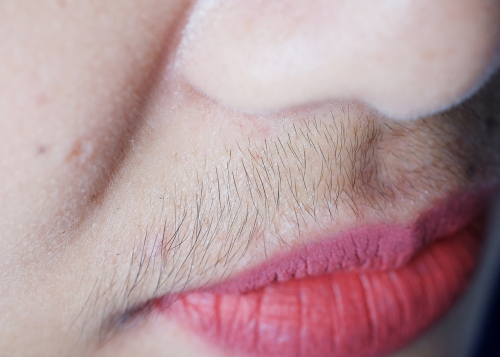
It is frequently said that hormones cause hair to grow unusually during women’s lives. Hormone changes and disorders may lead to a variety of issues besides unwanted hair. PCOS, Polycystic Ovary Syndrome (PCOS), pregnancy, menopause, and even some medicines can contribute to hormonal imbalances. In some cases, an endocrinologist may be the best person to diagnose and treat a condition. For unwanted hair, electrolysis is the answer.
All of a sudden I started sprouting these coarse hairs on my chin. I am only 40 years old. What’s wrong with me?
At your consultation, your electrologist will take a thorough health history. This will help them figure out a possible reason why this hair came on suddenly. Among the questions will be:
Do you have thyroid problems?
Are you diabetic?
Have you had menstrual or ovarian problems?
What medications do you take?
Do you have a family history of unwanted hair?
Some studies show women have symptoms of menopause 10 years before they reach menopause. This also could be the cause.
Electrologists cannot diagnose, but they can ask you questions that will help you have further discussions with your physician. Regardless of the cause, your electrologist can permanently remove the unwanted hair.
I have always had a lot of facial hair. I thought I was the only one, but now I am beginning to wonder – are there others like me?
There are many of us who are bothered by unwanted hair. Your electrologist has probably spent many hours receiving electrolysis treatments. Their sympathy comes from personal experience. It seems that there are more of us who have unwanted hair than those who do not. An endocrinologist (hormone specialist) may be able to assist you. When women are overweight, have difficulty losing weight, have irregular or no periods, and grow hair in the male pattern area (as you have described), they should be evaluated by a specialist. These are classic indications of Polycystic Ovary Syndrome (PCOS). PCOS can be treated in electrolysis by permanently removing unwanted facial and body hair.
What is the treatment for Polycystic Ovary Syndrome (PCOS)?
Treatment depends on the symptoms. Your primary physician or endocrinologist can determine the best course of action to alleviate specific symptoms you have. If weight is an issue, the most successful eating pattern is following a diabetic healthy eating plan. When choosing carbs, make sure they are complex carbs that don’t raise your blood sugar.
If you develop unwanted hair, electrolysis will get rid of the unwanted hair permanently. To address the medical issues, sometimes medications are prescribed by your physician.
I went to see the endocrinologist and she said all my tests came back normal. How can that be with all this hair on my face?
Dr. Jeffrey Redmond, a NY endocrinologist, has told the electrology profession that some people’s bodies are more sensitive to circulating hormones. So just because your blood levels have come back “normal,” it does not mean that they are normal for YOU! As hard as it may seem, go back and have another conversation with your endocrinologist. We must each be an active advocate for our own health.
I have both acne and chin hair. Will electrolysis help?
Chin hair on women is often exacerbated by tweezing and waxing. The repeated irritation from yanking hairs out can result in a larger diameter hair growing from the follicle or ingrown hairs from the breaking off of hairs in the follicle. When women tweeze hairs from their chin and have acne on their chin, but not on the rest of their face, they should find relief from their acne with electrolysis treatments.
Once they have stopped tweezing hairs from the chin and allow the electrologist to properly treat the hair, skin will clear. Hormonally caused facial hair on women usually grows in a pattern, starting with the chin and corners of the upper lip. Practitioners use the Ferriman Gallwey scale to document the amount of hair that the female client with excess hair presents.
What medications cause hair growth?
Many medications can cause hair growth or hair loss. Two of the main ones are Cortisol based medications as well as Hormone medications. Talk with your pharmacist about each medication you are on and also about how your medications interact.
Where can I get more information about electrolysis?
Answers to general questions about electrolysis are available my FAQ page or you are welcomed to reach out to me directly via my contact page.
